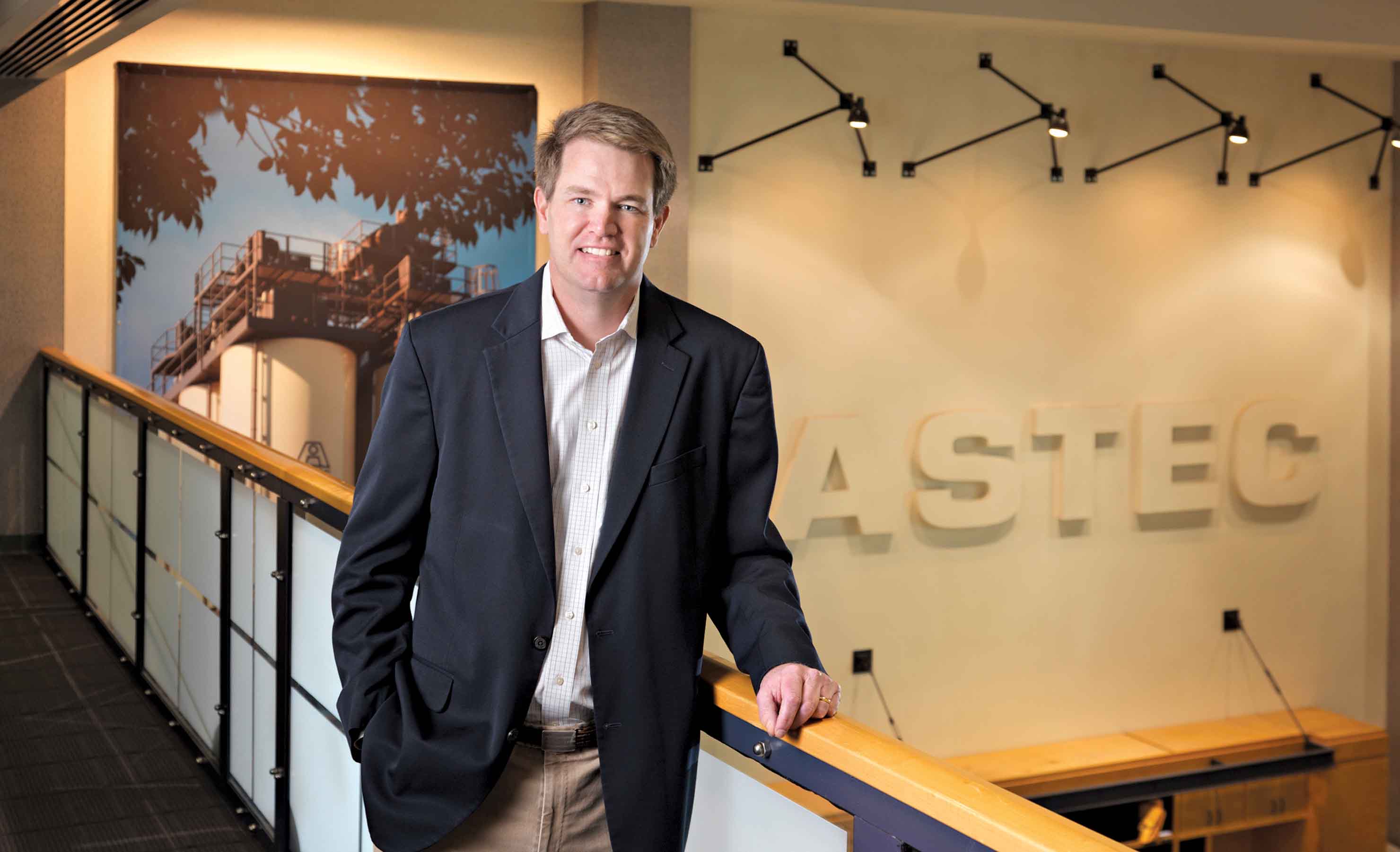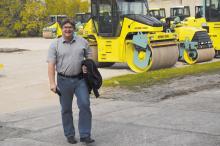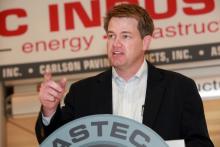Core values, constant innovation and looking after the customer are the key drivers for Ben Brock, chief executive officer and president of Astec Industries. How does he keep his company ahead of the pack and what does he think that the future holds?
if you ask Ben Brock to explain how his Astec Industries group has managed to do so well for so long, he doesn’t even pause for breath. “That’s easy, I thank the good doctor. He always told me: do good work and take care of the customer ... which is exactl

Astec Industries CEO Ben Brock thinks that the US and Europe are the main markets with big RAP opportunities today, and he is convinced that alternative materials in the mix are here to stay
Core values, constant innovation and looking after the customer are the key drivers for Ben Brock, chief executive officer and president of Astec Industries. How does he keep his company ahead of the pack and what does he think that the future holds?
if you ask Ben Brock to explain how his681 Astec Industries group has managed to do so well for so long, he doesn’t even pause for breath. “That’s easy, I thank the good doctor. He always told me: do good work and take care of the customer ... which is exactly what we do.” The doctor in question wasn’t a medical man, it was his father and company founder, Dr J Don Brock, who died last year having built up a billion-dollar Nasdaq-listed business from scratch, registering at least 100 patents along the way and creating more than 4,000 jobs around the world.
And you quickly learn that it is going to be a case of like father, like son. As chief executive officer and president, Ben is determined that the company is going to remain focused on constantly developing new products and relentlessly improving its service levels. He is also working hard to ensure that Astec Industries benefits from a US economy that is emerging from the worst economic crisis in living memory.
“The United States private economy for our customers in the infrastructure business has been improving over the last two years,” Brock said, “and we have been able to capitalise on their equipment needs, especially in the smaller commercial equipment market. We have also been able to have strong aggregate equipment sales over the last few years in the on-site and demolition crushing markets.”
Private sector business is all well and good, of course, but it is national and local governments that drive the speed of big infrastructure projects. Brock sees positive signs here as well, not least because of the new five-year Federal Highway Bill in the US which will “open up the larger capital equipment activity in our infrastructure group. Combine these developments with our diversification in to wood pellet production plants over the last few years and we become the beneficiaries of good timing, great products and well located businesses.”
Financial analysts like Capital Cube and The Street agree with him, regularly putting out investor reports with recommended buy tags and sound bites such as “considering peers, relative outperformance over the last year and the last month suggest a leading position ... Astec Industries Inc currently trades at a higher Price/Book ratio (1.43) than its peer median (1.06) ... the market expects Astec to grow faster than its peers and for the company to improve its current ROE ... Astec has a successful operating model with relatively high net profit margins and asset turns ... the company’s year-on-year change in revenues and earnings are better than the median among its peer group ... over the last five years, Astec‘s return on assets has improved from median to better than the median among its peers, suggesting the company has found relative operating advantages.”
Through it all, Brock tries to stay true to some simple home truths. “Anyone can build equipment,” he said. “So, the one thing I would say is that our strategy starts with our core values (which) guide how we execute our work around the world. We build and/or assemble equipment in 20 manufacturing plants around the globe located in the United States, Canada, Brazil, Northern Ireland, Germany, South Africa and Australia.” And, “regardless of the region, our core values are not optional.”
These values include continuous devotion to meeting the needs of our customers, honesty and integrity in all aspects of business, respect for all individuals, entrepreneurial spirit, innovation, and decentralisation.
They will guide Brock and his board forward: “we have completed a new five-year strategic plan with a goal to double the size of our company (via) 10% organic growth and 5% growth-through-acquisition annually. To do this we need to continue our heritage of innovation with new products, to search out new markets and to provide our industry-leading customer care service.”
And they will keep it lean and mean. “Frankly, we were slow to the lean effort,” Brock said, and “lean is an old word in many companies. But we are making up ground fast and it will show up in our results as we earn more business with customers.”
It is the innovative side of things he returns to most often though. “We have applied for many patents across our 18 subsidiaries since January 1, 2014. We applied for several in the first three months of this year. In the end, our goal is to bring out new ideas that will help our customers be more successful in the work that they do with our equipment … and outdate ourselves along the way so that we are not the outdated by someone else.” No easy task when you have 220 different product lines across the group.
Does he see technology as a key differentiator? Yes, definitely, “and the deals we closed at bauma were for our higher technology products … (machines) that give our customers the chance to be more successful over the long term versus the competitive offerings. In the case of a large asphalt plant order going to the Middle East, for instance, our product payback was the difference-maker. Not all customers look to the life of the plant for the payback. Many only consider the upfront cost, which is a challenge in this currency environment, and that is reflected in our overall export sales at the moment.”
Selling overseas means working through local dealers and distributors of course. And Brock is thinking big here as well: “Our2987 Telsmith subsidiary used to be our only truly internationally focused division until 2007 when we decided that we wanted and needed to become a more global company. At that time Astec had 5 signed agents. Today, Astec has a global dealer network of more than 50 signed dealers and agents and 1252 Roadtec is on the same track now. (And) the rest of our aggregate equipment divisions are doing the same.”
In the crowded European market, Roadtec mobile equipment is leading the charge for the group and there will be no move into compaction equipment which Brock sees as “a very tough and competitive market. We do not have any immediate plans to enter the compaction equipment market, (even though) we have certainly looked at it in the past.” His mind is much more focused on the next generation of the Roadtec Shuttle Buggy instead, and “a new, patented design that is testing in the field. We will most likely officially release it late this year.” Apart from that, his lips are sealed.
Astec will go on looking at the way in which local markets around the world need different solutions, and tailoring its product range accordingly. The European angle on asphalt plants, for instance, means being sensitive to the split between batch plants and continuous mix plants. According to Brock, “the United States is a continuous plant market (whereas) Europe, except for France, is mostly a batch plant market. The fallacy in the debate is the belief that batch mix is better than continuous mix. We build both style plants. We have a batch plant in our shop right now going to South America. Both style plants make great mix.”
He decides to give a practical example: “We have as good an interstate between Atlanta, Georgia, and Chattanooga, Tennessee, as you can find on this planet. And I have been to 58 countries since 2007, many of them in Europe. We have a company in Germany. I love driving rental cars on the Autobahn. I love driving my car on the US interstate. Good mix comes from both style plants. Show me a good operator, and I will show you good mix from either plant. Show me a poor operator, and I will show you poor mix from both plants.”
So, given all of that, what does Brock think will be the single biggest driver of change in our industry over the next 5 to 10 years? “Believe it or not, RAP is still the biggest driver of change as governments get more comfortable with higher percentages in public work. We have customers that average 60-65% RAP in their mix every day. And it is high quality mix. That is uncommon in most markets globally. Some plants have projects that run as high, or higher percentages on a one-off basis, but to run that much RAP, at a high quality all of the time, is unique, and you need a major metro area to be able to keep that much RAP on hand.”
“The United States and Europe are the main markets with that opportunity today. Alternative materials like rubber and shingles will also grow. And then the technology and data from plant controls will be used more often by sophisticated companies that want instant and growing data … we are working on this as we speak.”
When government policy around the world affects what happens so directly, does Brock think that the highway construction and maintenance industry taken seriously? Could the industry lobby better for more investment spending?
“Trade associations generally do a terrific job telling the story to elected officials, but they are one of many (lobby groups) that bend the ears of the elected officials and their staff members. In the end, it is up to industry members - contractors, equipment suppliers, vendors - to make the noise behind the association representing them. During the process to get the five-year Federal Highway Bill passed in the United States recently, we found that getting letters in support of funding was the key difference in getting the bill passed. In the end, the association is your voice, you are the volume … so write your elected officials every month and get everyone you know to do it too every month until you get it done. There’s an old saying in the United States that ‘the squeaky wheel gets the grease.’ It’s up to us to squeak.” The good doctor would surely agree.
if you ask Ben Brock to explain how his
And you quickly learn that it is going to be a case of like father, like son. As chief executive officer and president, Ben is determined that the company is going to remain focused on constantly developing new products and relentlessly improving its service levels. He is also working hard to ensure that Astec Industries benefits from a US economy that is emerging from the worst economic crisis in living memory.
“The United States private economy for our customers in the infrastructure business has been improving over the last two years,” Brock said, “and we have been able to capitalise on their equipment needs, especially in the smaller commercial equipment market. We have also been able to have strong aggregate equipment sales over the last few years in the on-site and demolition crushing markets.”
Private sector business is all well and good, of course, but it is national and local governments that drive the speed of big infrastructure projects. Brock sees positive signs here as well, not least because of the new five-year Federal Highway Bill in the US which will “open up the larger capital equipment activity in our infrastructure group. Combine these developments with our diversification in to wood pellet production plants over the last few years and we become the beneficiaries of good timing, great products and well located businesses.”
Financial analysts like Capital Cube and The Street agree with him, regularly putting out investor reports with recommended buy tags and sound bites such as “considering peers, relative outperformance over the last year and the last month suggest a leading position ... Astec Industries Inc currently trades at a higher Price/Book ratio (1.43) than its peer median (1.06) ... the market expects Astec to grow faster than its peers and for the company to improve its current ROE ... Astec has a successful operating model with relatively high net profit margins and asset turns ... the company’s year-on-year change in revenues and earnings are better than the median among its peer group ... over the last five years, Astec‘s return on assets has improved from median to better than the median among its peers, suggesting the company has found relative operating advantages.”
Through it all, Brock tries to stay true to some simple home truths. “Anyone can build equipment,” he said. “So, the one thing I would say is that our strategy starts with our core values (which) guide how we execute our work around the world. We build and/or assemble equipment in 20 manufacturing plants around the globe located in the United States, Canada, Brazil, Northern Ireland, Germany, South Africa and Australia.” And, “regardless of the region, our core values are not optional.”
These values include continuous devotion to meeting the needs of our customers, honesty and integrity in all aspects of business, respect for all individuals, entrepreneurial spirit, innovation, and decentralisation.
They will guide Brock and his board forward: “we have completed a new five-year strategic plan with a goal to double the size of our company (via) 10% organic growth and 5% growth-through-acquisition annually. To do this we need to continue our heritage of innovation with new products, to search out new markets and to provide our industry-leading customer care service.”
And they will keep it lean and mean. “Frankly, we were slow to the lean effort,” Brock said, and “lean is an old word in many companies. But we are making up ground fast and it will show up in our results as we earn more business with customers.”
It is the innovative side of things he returns to most often though. “We have applied for many patents across our 18 subsidiaries since January 1, 2014. We applied for several in the first three months of this year. In the end, our goal is to bring out new ideas that will help our customers be more successful in the work that they do with our equipment … and outdate ourselves along the way so that we are not the outdated by someone else.” No easy task when you have 220 different product lines across the group.
Does he see technology as a key differentiator? Yes, definitely, “and the deals we closed at bauma were for our higher technology products … (machines) that give our customers the chance to be more successful over the long term versus the competitive offerings. In the case of a large asphalt plant order going to the Middle East, for instance, our product payback was the difference-maker. Not all customers look to the life of the plant for the payback. Many only consider the upfront cost, which is a challenge in this currency environment, and that is reflected in our overall export sales at the moment.”
Selling overseas means working through local dealers and distributors of course. And Brock is thinking big here as well: “Our
In the crowded European market, Roadtec mobile equipment is leading the charge for the group and there will be no move into compaction equipment which Brock sees as “a very tough and competitive market. We do not have any immediate plans to enter the compaction equipment market, (even though) we have certainly looked at it in the past.” His mind is much more focused on the next generation of the Roadtec Shuttle Buggy instead, and “a new, patented design that is testing in the field. We will most likely officially release it late this year.” Apart from that, his lips are sealed.
Astec will go on looking at the way in which local markets around the world need different solutions, and tailoring its product range accordingly. The European angle on asphalt plants, for instance, means being sensitive to the split between batch plants and continuous mix plants. According to Brock, “the United States is a continuous plant market (whereas) Europe, except for France, is mostly a batch plant market. The fallacy in the debate is the belief that batch mix is better than continuous mix. We build both style plants. We have a batch plant in our shop right now going to South America. Both style plants make great mix.”
He decides to give a practical example: “We have as good an interstate between Atlanta, Georgia, and Chattanooga, Tennessee, as you can find on this planet. And I have been to 58 countries since 2007, many of them in Europe. We have a company in Germany. I love driving rental cars on the Autobahn. I love driving my car on the US interstate. Good mix comes from both style plants. Show me a good operator, and I will show you good mix from either plant. Show me a poor operator, and I will show you poor mix from both plants.”
So, given all of that, what does Brock think will be the single biggest driver of change in our industry over the next 5 to 10 years? “Believe it or not, RAP is still the biggest driver of change as governments get more comfortable with higher percentages in public work. We have customers that average 60-65% RAP in their mix every day. And it is high quality mix. That is uncommon in most markets globally. Some plants have projects that run as high, or higher percentages on a one-off basis, but to run that much RAP, at a high quality all of the time, is unique, and you need a major metro area to be able to keep that much RAP on hand.”
“The United States and Europe are the main markets with that opportunity today. Alternative materials like rubber and shingles will also grow. And then the technology and data from plant controls will be used more often by sophisticated companies that want instant and growing data … we are working on this as we speak.”
When government policy around the world affects what happens so directly, does Brock think that the highway construction and maintenance industry taken seriously? Could the industry lobby better for more investment spending?
“Trade associations generally do a terrific job telling the story to elected officials, but they are one of many (lobby groups) that bend the ears of the elected officials and their staff members. In the end, it is up to industry members - contractors, equipment suppliers, vendors - to make the noise behind the association representing them. During the process to get the five-year Federal Highway Bill passed in the United States recently, we found that getting letters in support of funding was the key difference in getting the bill passed. In the end, the association is your voice, you are the volume … so write your elected officials every month and get everyone you know to do it too every month until you get it done. There’s an old saying in the United States that ‘the squeaky wheel gets the grease.’ It’s up to us to squeak.” The good doctor would surely agree.











